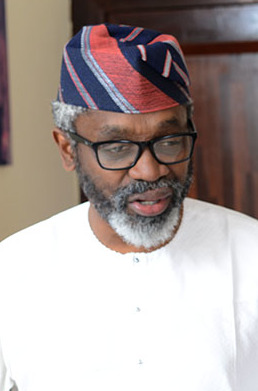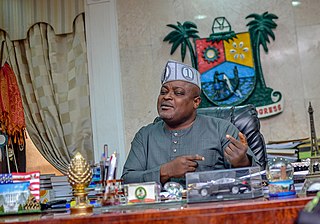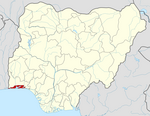Related Research Articles

Olufemi Hakeem Gbajabiamila, is a Nigerian lawyer and politician. A member of the All Progressives Congress (APC), Gbajabiamila has served as Speaker of the House of Representatives since 2019.

Babatunde Raji FasholaSAN is a Nigerian lawyer and politician currently serving as the Federal Minister of Works and Housing of Nigeria. He served two terms as Governor of Lagos State from 29 May 2007 to 29 May 2015.

The governor of Lagos State is the head of government of Lagos State in Nigeria. The governor leads the executive branch of the Lagos State Government. This position places its holder in leadership of the state with command authority over the state affairs. The Governor is frequently described to be the number one citizen of the state. Article II of the Constitution of Nigeria vests the executive power of the state in the governor and charges him with the execution of state law, alongside the responsibility of appointing state executive, diplomatic, regulatory, and judicial officers subject to the approval of the Assembly members.

Yakub Abiodun BalogunListen is a Nigerian economist, public administrator, legislator in the House of Representatives of Nigeria, representing Lagos Island Federal Constituency II, Lagos State, South-West Nigeria and former Lagos State Head of Service.
The Lagos State Civil Service consists of employees in Lagos State government agencies other than the military. Most employees under the service are career civil servants in the Lagos state ministries, progressing based on qualifications and seniority. The civil service is headed by Head of Service, a senior member of the state civil service appointed by the state Governor. The head of service of Lagos state civil service is Hakeem Muri-Okunola.

The speaker of the Lagos State House of Assembly is the presiding officer of the Lagos State House of Assembly, elected by its membership. The Speaker is second in line of succession to the Lagos State governorship, after the deputy governor. The Speaker also represents the members of his or her constituency. Since inauguration of the state house of assembly on 2 October 1979, there have been 9 legislative assemblies with 7 representatives holding the office of Speaker. The current Speaker is Rt. Hon. Mudashiru Obasa who was elected on 8 June 2015.
The 6th Lagos State House of Assembly is the legislative branch of the Lagos State Government inaugurated on June 4, 2007 and the assembly ran its course till July 4, 2011. The assembly was unicameral with 41 representatives elected from each constituencies of the state. The Speaker of the 6th Legislative Assembly was Rt. Hon Adeyemi Ikuforiji and the Deputy speaker was Hon. Bola Badmus Olujobi.
Sabit Adeyemi Ikuforiji is a Nigerian economist and politician who served as speaker of the Lagos State House of Assembly from 2005 to 2015.
The 2nd Lagos State House of Assembly is the legislative branch of the Lagos State Government inaugurated on October 6, 1983, and the assembly ran its course till January 10, 1992. The assembly was unicameral with 41 representatives elected from each constituencies of the state. The Speaker of the 2nd Legislative Assembly was Rt. Hon Oladimeji Longe and the Deputy speaker was Hon Afolabi Oredoyin. The 3rd Assembly was inaugurated on January 14, 1992, with the emergence of Hon. Shakirudeen Kinyomi as Speaker.
The Ondo State House of Assembly is the legislative branch of the Ondo State Government inaugurated on February 3, 1979. The assembly is unicameral with 26 representatives elected from each constituencies of the 18 local government area of the state. In 2011, the assembly consists of two political parties, LP and the PDP but the assembly was dominated by the Labour party with a total number of 25 representative and the PDP with only one representative. In October 2015, all members of the assembly defected to the PDP following the defection of Olusegun Mimiko, the governor of the state who was re-elected on May 29, 2011 following the April 11, 2011 election. Presently, the Assembly comprises 23 members of the PDP and 2 members of the APC with a vacant seat.
Oluwafunmilayo Olajumoke Atilade is a Nigerian Jurist and former Chief Judge of Lagos State. She was formerly a judge at the High Court of Lagos State.
Adeola Rahman Ipaye is a Nigerian lawyer who is currently the Deputy Chief of Staff to the President of Nigeria. He was also Attorney General and Commissioner for Justice in Lagos State, among other political posts he has held.
Attorney General of Lagos state also known as Lagos State Commissioner for Justice is the head of the Lagos State Ministry of Justice. The officer's duty is to ensure that "the laws of the state are uniformly and adequately enforced". The Attorney General carries out the responsibilities of the office through the Ministry of Justice. The Attorney General is appointed to a four-years term, with a maximum of two terms, by the Governor subject to the approval of the State House of Assembly. The incumbent Attorney General is Moyosore Onigbanjo, Preceded by Mosediq Adeniji Kazeem.
The Lagos State Judiciary is one of the three co-equal branches of the Lagos State Government organized under the Constitution of Nigeria and laws of Lagos State. The Chief Judges are appointed by the State Governor with the consent of the House of Assembly.
The Chief Judge of Lagos State is the head of the Lagos State Judiciary, the judicial branch of the Lagos State Government and the chief judge of the High Court of Lagos State. From 1967 to 1973, the title was called Chief Justice of the Supreme Court. The appointment is often made by the Governor. "Section 271(1) of the Constitution provides that ‘The appointment of a person to the office of the Chief Judge of a State shall be made by the Governor of the State on the recommendation of the National Judicial Council, subject to the confirmation of the appointment by the House of Assembly of the State,’".
The National Judicial Council (NJC), is an executive body established by the Federal Government of Nigeria in accordance with the provisions of Section 153 of the 1999 Constitution as amended to protect the Judiciary of Nigeria from the whims and caprices of the Executive.
Lagos State Government is the government of Lagos State, concerned with the administration of the state ministries. The government consists of the executive, legislative and Judiciary. The government is headed by the Governor who is the policy-maker and often assisted by the commissioners and other civil servants of the state.
The 8th Lagos State House of Assembly is the legislative branch of the Lagos State Government inaugurated on June 8, 2015. The assembly will run its course till June 3, 2019. The assembly is unicameral with 41 representatives elected from each constituencies of the state. The incumbent Speaker of the 8th Legislative Assembly is Rt. Hon Mudashiru Obasa and the Deputy speaker is Hon. Eshinloku Sanni. The election of representative for the 8th legislative assembly was held on April 28, 2015.
The Kaduna State Governor is the head of Kaduna State Government. The governor leads the executive branch of the Government. This position places its holder in leadership of the state with command authority over the state affairs. The Governor is frequently described to be the number one citizen of the state. Article II of the Constitution of Nigeria vests the executive power of the state in the governor and charges him with the execution of state law, alongside the responsibility of appointing state executive, diplomatic, regulatory, and judicial officers subject to the approval of the Assembly members. The governor of the state is elected to office during a national election democratically, the election is organized by the Independent National Electoral Commission (INEC), and conducted after every four years of a term. A governor can only contest the office twice if successful, in other word, spend maximum of eight years in office.
Kano State Government is the government of Kano State, concerned with the administration of the state ministries. The government consists of the executive, legislative and Judiciary. The government is headed by the Governor who is the policy-maker and often assisted by the Commissioners and other civil servants of the state.
References
- ↑ "Intrigues That Ushered in 7th Lagos Assembly". TheNigerianVoice. Retrieved 17 April 2015.
- ↑ "Lagos State Finances and Alpha Beta Ltd By Seyi Olu Awofeso". Sahara Reporters. Retrieved 17 April 2015.
- ↑ Oziegbe Okoeki. "Lagos sets pace with Assembly Commission". The Nation. Retrieved 17 April 2015.
- ↑ "Lagos State House of Assembly - INFORMATION NIGERIA". informationng.com. Retrieved 17 April 2015.
- ↑ "APC Leaders At Lagos State House of Assembly Grant Themselves Lifetime Benefits, Opulent Allowances". Sahara Reporters. Retrieved 17 April 2015.
- ↑ "Eshilokun may emerge as Lagos Speaker". The Punch - Nigeria's Most Widely Read Newspaper. Archived from the original on 18 April 2015. Retrieved 17 April 2015.
- ↑ Leadership Newspaper (12 April 2015). "Lagos House Of Assembly Elections: Elliot, Lai Mohammed's Son, Others Declared Winners As Sons Of Obanikoro, Ajomale Lose". Nigerian News from Leadership News. Archived from the original on 18 April 2015. Retrieved 17 April 2015.
- ↑ "Results of Lagos Governorship, House of Assembly polls". Vanguard News. Retrieved 17 April 2015.
- ↑ "Fashola Swears in Four Judges, Charges them to Better the Judiciary, Articles - THISDAY LIVE". thisdaylive.com. Archived from the original on 12 January 2015. Retrieved 17 April 2015.
- ↑ "Lagos Governor Signs 2010 Budget". TheNigerianVoice. Retrieved 17 April 2015.
- ↑ "Lagos Assembly Approves 499.105bn as 2013 Budget, Articles - THISDAY LIVE". thisdaylive.com. Archived from the original on 18 April 2015. Retrieved 17 April 2015.
- ↑ "Lagos Cabinet: Fashola Submits 37 Names to Assembly , Articles - THISDAY LIVE". thisdaylive.com. Archived from the original on 16 April 2015. Retrieved 17 April 2015.
- ↑ "Fashola approves appointment of six new judges for Lagos High Court - Premium Times Nigeria". Premium Times Nigeria. Retrieved 17 April 2015.
